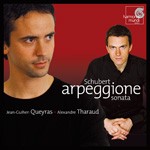I hereby subtitle this release “When bad concepts happen to good musicians.” Granted, the back-cover blurb rightly claims that Schubert, Webern, and Berg are three Viennese composers who transcend their time; but do Webern’s wispy, delicate Three Pieces Op. 11 or Berg’s intense Four Pieces Op. 5 make good program sense or gain illumination when sandwiched in between brief Schubert song transcriptions (with strophic verses abridged)? Can a listener fully absorb Webern and Berg’s harmonic ambiguity and compressed time scales so soon after the expansive twists and turns of Schubert’s Arpeggione sonata? Maybe yes, but most probably no. I also contend that the original violin version of Schubert’s Sonatine D. 384 loses much of its soaring sweetness when tailored to the cello’s darker depths. Likewise, Berg’s biting, idiomatic-as-hell clarinet writing gets lost in cello translation, save for effective use of harmonics in the final Langsam movement.
All this should not take away from the effortless and elegant rapport that Jean-Guihen Queyras and Alexandre Tharaud consistently achieve. Queyras’ impeccable, note-perfect control of the Arpeggione’s notoriously difficult high-lying passages either will make cellists sob in despair or inspire them to practice, practice, practice. Having enjoyed Tharaud’s sensitive, perpetually singing Schubert playing on an earlier Harmonia Mundi release (type Q6809 in Search Reviews), his sensitive, absolutely equal partnership with Queyras comes as no surprise. Rate this disc 5 for loopy programming, 10 for musicianship. My final 8/9 verdict more or less splits the difference.
































